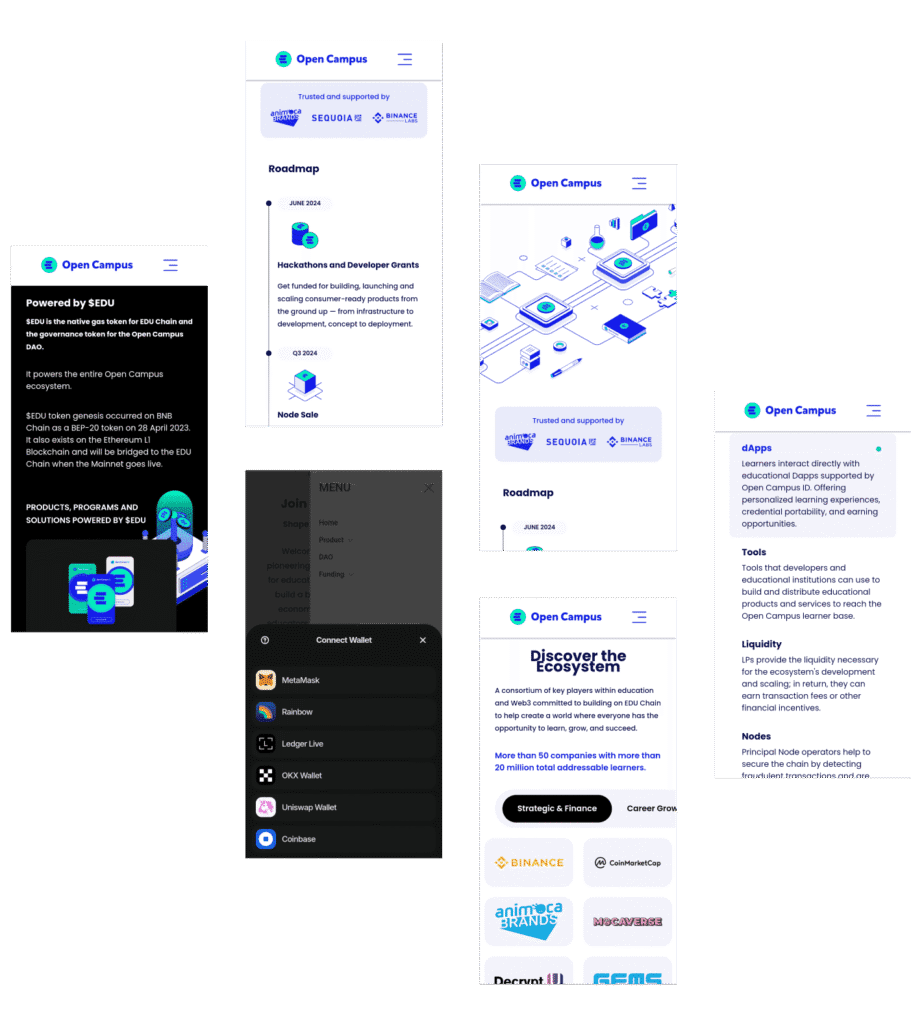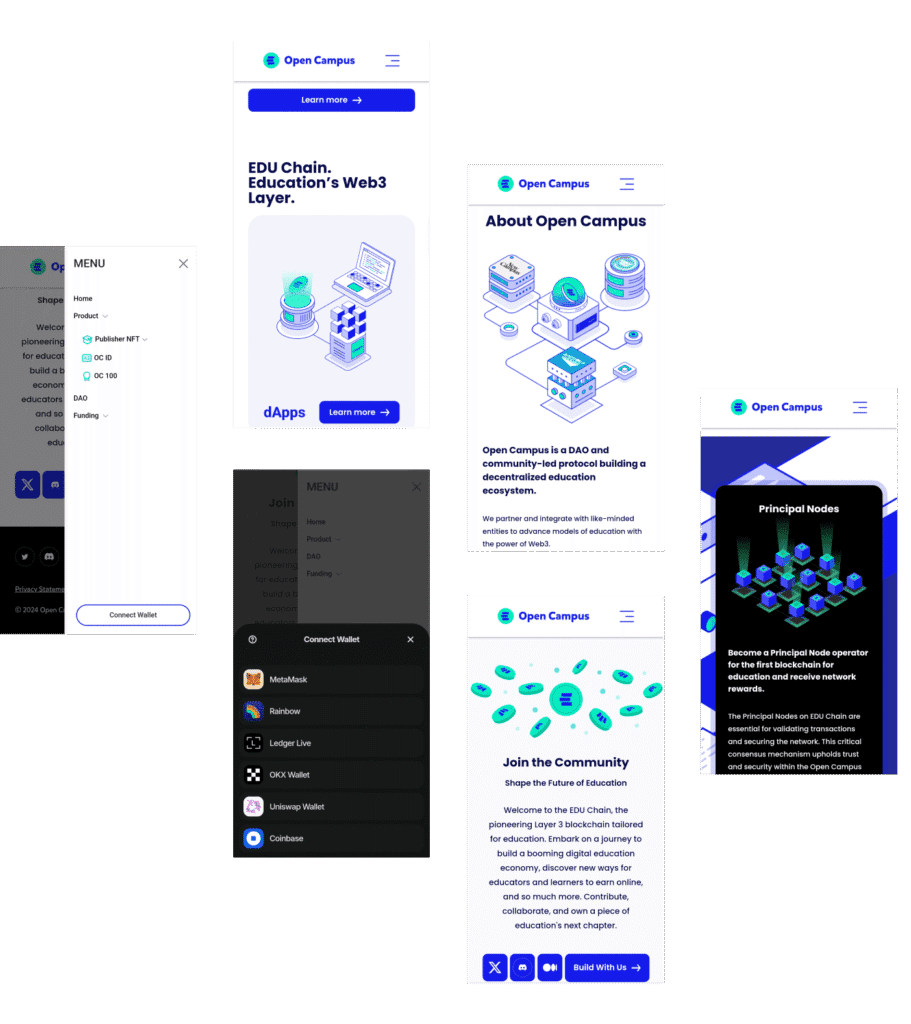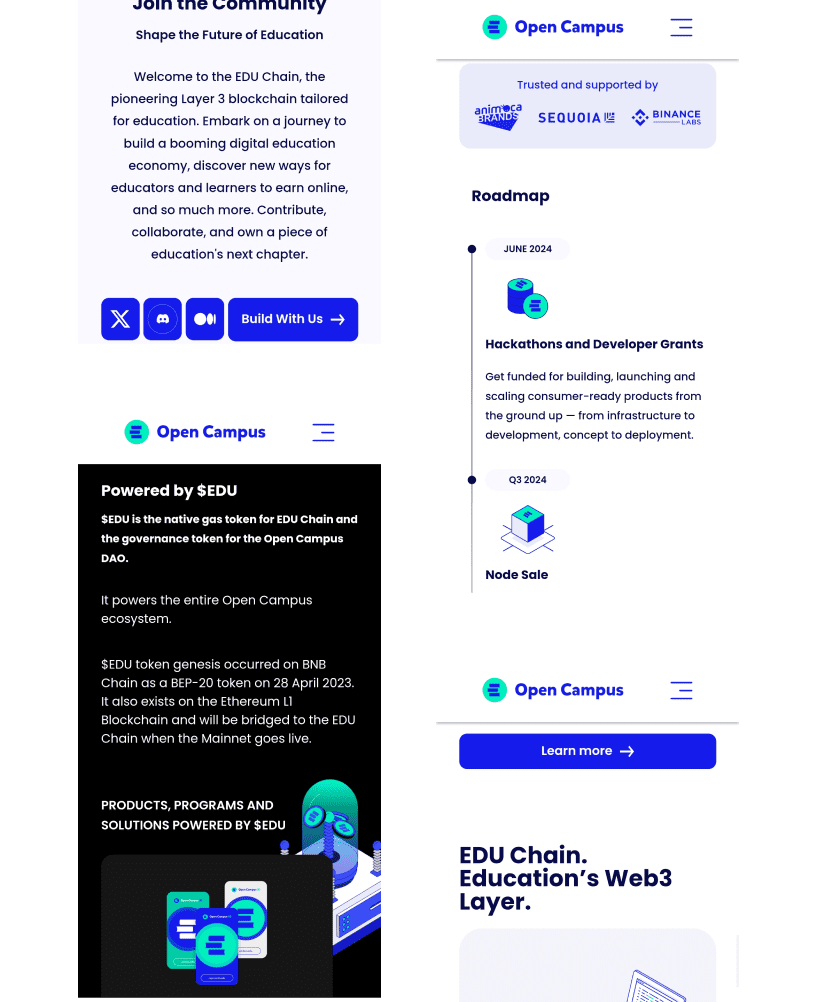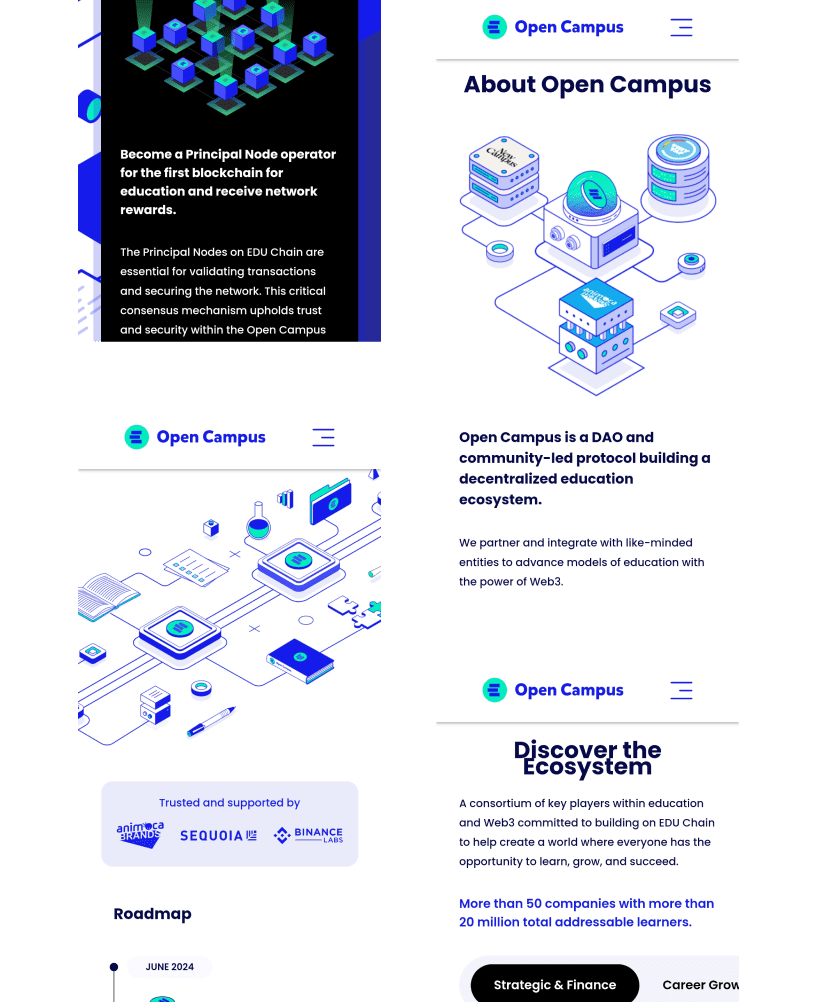
The Future of Blockchain in Education
Open Campus is an innovative initiative that introduces EDU Chain, the first Layer 2 blockchain designed specifically for the education sector. By harnessing blockchain technology, Open Campus aims to create a decentralized ecosystem that transforms the learning experience and introduces a Learn-to-Earn model. This unique approach enables learners to earn rewards for their educational achievements, making the entire journey more engaging and valuable.

Get Started with this product
Earn rewards by engaging in courses, assessments, and milestones. This model motivates learners with financial incentives, making education interactive, rewarding, and aligned with personal skill development goals.
OC ID gives learners control over secure digital identities and credentials. Blockchain ensures easy, tamper-proof sharing across platforms, enhancing trust and improving job and education opportunities.
Principal Nodes validate transactions and maintain network security. Operators earn $EDU rewards, promoting trust, performance, and active community participation in securing the Open Campus ecosystem.
Users provide funds to liquidity pools, facilitating smooth transactions. In return, providers earn fees, promoting ecosystem growth, stability, and improved user experiences through reliable resource availability.
Open Campus offers blockchain-based DApps for interactive courses and collaboration. These secure, transparent apps personalize learning, enable feedback, and foster innovation in educational content and delivery.
Educators mint course materials as $EDU tokens, ensuring fair compensation. Tokenization promotes revenue sharing, collaboration, and easier access to quality courses, benefiting both creators and learners.
Open Campus funds developers building educational tools and DApps. Grants support innovation in learning, credential verification, and engagement, fostering a vibrant community that enhances educational access globally.
A six-week program supports education startups with funding, mentorship, and networking. It helps scale innovative ideas, strengthening the ecosystem and improving access and quality in education worldwide.
Open Campus required a robust blockchain infrastructure to address the evolving needs of the education sector. The primary goal was to create a decentralized ecosystem where learners could earn rewards while engaging in educational activities. To achieve this, the platform needed to be user-friendly, catering to both tech-savvy individuals and those new to blockchain technology. Security was paramount, necessitating reliable mechanisms for validating transactions and ensuring the credibility of educational credentials. Additionally, Open Campus sought to facilitate liquidity for the ecosystem, allowing for seamless transactions and interactions among users.
Another critical requirement was scalability, as Open Campus aimed to support a large number of users and transactions without compromising performance. The initiative also emphasized forming partnerships with various educational institutions and Web3 organizations to create a consortium dedicated to improving educational access and quality. Furthermore, the platform needed tools for developers to create educational decentralized applications (DApps), thereby fostering a thriving ecosystem of innovative educational products and services.

PoS lets users stake $EDU tokens to validate transactions. More tokens staked increase validation chances, boosting security while reducing energy use compared to Proof of Work, making it eco-friendly.
PBFT achieves consensus despite faulty nodes by requiring supermajority agreement through message exchanges. It tolerates up to one-third faulty nodes, ensuring secure, reliable operation for critical blockchain applications.
Federated consensus relies on a selected group of trusted nodes to validate transactions, improving speed and security. It balances decentralization and trust, ideal for applications needing fast, reliable transaction confirmations.
Combining multiple consensus methods, the hybrid model boosts security, scalability, and efficiency. It adapts dynamically, using PoS and DPoS to balance transaction throughput and robust protection for blockchain education use.
DPoS lets token holders delegate voting to trusted validators who confirm transactions efficiently. Elected delegates earn rewards, enhancing network scalability, security, and giving stakeholders governance power.
Trusted authority nodes validate transactions exclusively, speeding block creation and improving efficiency. Suitable for private networks, it depends on reputable nodes following governance and security protocols to maintain trust.
PoA uses pre-approved validators chosen by reputation to confirm transactions quickly with low resource use. Best for permissioned networks, it depends on validator integrity to maintain security and accountability.
Users staking $EDU tokens earn rewards proportional to stake and duration, encouraging long-term investment. This strengthens network security and fosters community participation within the Open Campus ecosystem.
Visual identity and design elements
Primary font family and usage

Brand colors
#c2c2c2
#0f15b3
Project Approach The approach to developing Open Campus involved a comprehensive strategy that prioritized collaboration, innovation, and user engagement. The project began with extensive market research to identify the needs of learners, educators, and institutions in the education sector. This research informed the design of the EDU Chain and its associated features, ensuring that they addressed the unique challenges faced by stakeholders. The team adopted an agile development methodology, allowing for iterative improvements based on user feedback and technological advancements. This flexible approach facilitated the creation of decentralized applications (DApps) tailored to various educational scenarios, enhancing user interaction and overall experience.
Additionally, Open Campus focused on building strategic partnerships with educational institutions, technology providers, and Web3 organizations.
Project Results The implementation of Open Campus has led to significant advancements in the education sector, with the EDU Chain attracting a diverse user base of learners and educators. Since its launch, the platform has successfully facilitated numerous educational transactions, demonstrating the effectiveness of the Learn-to-Earn model. Users have reported increased engagement and motivation due to the financial rewards associated with their learning progress. The decentralized identity feature has also garnered positive feedback, as learners can easily manage and showcase their credentials across multiple platforms, enhancing their employability and educational opportunities.
Moreover, the collaboration with educational institutions and industry partners has resulted in a rich ecosystem of DApps that cater to various learning styles and preferences. The accelerator program has successfully supported numerous startups, fostering innovation and growth within the educational landscape.

One of the primary challenges faced by Open Campus is driving user adoption in a market that is still largely unfamiliar with blockchain technology. Many potential users, including educators and learners, may have limited knowledge of how blockchain works and how it can benefit their educational experiences. To address this, Open Campus needs to invest in comprehensive educational resources, workshops, and community engagement initiatives. These efforts must focus on demonstrating the value of the Learn-to-Earn model and how decentralized identity and credential portability can enhance their learning journey.
Navigating the complex landscape of regulatory compliance poses a significant challenge for Open Campus. The education sector is heavily regulated, and blockchain technology introduces additional layers of complexity. Open Campus must ensure that its operations align with existing educational laws and regulations, particularly regarding data privacy and security. This involves working closely with legal experts to interpret regulations across different jurisdictions and adapt the platform accordingly.
As Open Campus aims to support a growing number of users and transactions, ensuring technical scalability becomes increasingly challenging. The underlying blockchain infrastructure must handle increased loads without sacrificing performance or security. This includes managing transaction speeds, network congestion, and the overall user experience. To address this challenge, Open Campus may need to explore various scaling solutions, maintaining a balance between decentralization and efficiency will be critical, as overly centralized solutions may compromise the platform’s core principles.

Open Campus offers decentralized education, Learn-to-Earn incentives, credential portability, and developer tools for DApps.





